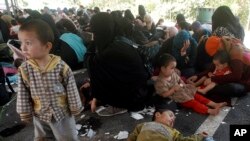A report by Human Rights Watch calls on the Thai Government to end its policy of detaining migrant and refugee children in immigration detention centers, saying the process is arbitrary and in violation of international law. The New York-based rights group says alternatives to detention should be examined, as well as improved conditions in the centers.
Human Rights Watch says at least 4,000 children of migrant workers and refugee children are processed through Thai immigration detention centers each year.
The report says the children stay on average nearly 10 months, but many are held for up to two years.
Alice Farmer is a children's rights researcher with Human Rights Watch.
"Thailand has a system of arbitrary detention of children and migrant families that detention can often be indefinite and that arbitrary indefinite detention is in violation of international law including the convention on the rights of the child to which Thailand is a party," said Farmer.
The study was based on interviews of over 100 migrant children and adults as well as government officials from the immigration department, the police and the ministry of social development and human security.
Human Rights Watch says detention centers often are severely overcrowded, and children are packed into cramped cells with adults. In a case study, a family was shared a cell with 100 others, with filthy toilets and raw sewerage on the floor and poor air quality.
Thailand has also faced a sharp increase in refugees and asylum seekers from Syria, Pakistan, Sri Lanka and Somalia, although the vast majority of those held in the detention centers are from neighboring Myanmar, also known as Burma.
Farmer says that because families often are separated, children are left at risk of psychological harm and physical health concerns, including insufficient nutrition and poor medical care. They also often have inadequate access to education.
"When children are detained at a young age they don't understand why it's happening to them, particularly for refugee children they have often fled conditions that are traumatic in the course of fleeing to another country, they have experienced more trauma during their journey, and immigration detention just exacerbates those problems," said Farmer.
Those in the detention centers receive some assistance from non-government organizations, the United Nations Office for Migration, and the U.N.'s High Commission for Refugees as well as foreign embassies in Bangkok.
Human Rights Watch asks Thailand's government to end immigration detention of children in line with guidelines set by the U.N.'s Committee on the rights of the child.
The Thai government's response to the report says that problems in detention camps are being addressed, and that the government takes seriously its responsibilities to protect children. It also said many migrant and refugee adults ask to have their children remain with them in camps. In addition, the government says, delays in releasing detainees often have to do with their lack of legal status in their home countries, or because of delays by the United Nations in assessing their asylum requests.











